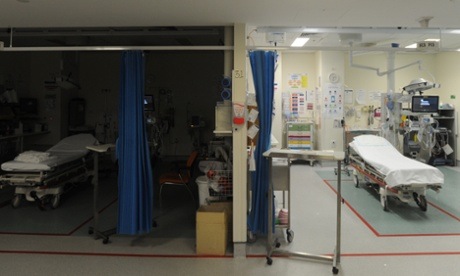
Patients who have attempted suicide are too often treated with hostility by hospital emergency department staff, senior Australian psychiatrists have said, meaning opportunities to prevent future harm are being missed.
A study from the mental health charity Sane Australia and the University of New England released on Thursday found people who have attempted suicide reported being discharged too early or having difficulty being admitted to hospitals.
Researchers interviewed 31 people from around Australia who had made an attempt on their life, with 80% describing their experience in hospital as negative and nearly one-third feeling they were not taken seriously.
“People often try to get help, usually after considerable trauma which is difficult to talk about,” Sane’s suicide prevention manager, Sarah Coker, said. “It can be really distressing if, when they finally reach out, they are misunderstood or discharged quickly.”
Pat McGorry, professor of youth mental health at the University of Melbourne and executive director of mental health program Orygen Youth Health, said part of the problem was that emergency departments were inherently non-therapeutic environments.
“Even mental health staff are often hostile rather than caring or nurturing, and that’s what this survey reflects,” McGorry said. “The system is not taking suicide risk seriously.”
Mental health patients who had tried to take their life were treated less sympathetically than patients coming in for physical ailments, such as a heart attack, he said.
“That’s not to say there aren’t plenty of dedicated staff,” McGorry said. “But it is all too common that the patient who made an attempt on their life, who is desperate and in emotional pain, turns up and is seen by emergency department staff as a nuisance rather than as someone with a life-threatening emergency.”
Associate Professor Sally McCarthy, the immediate past president of the Australasian College for Emergency Medicine, rejected comments that patients who had tried to take their own life were treated poorly in emergency departments, describing such comments as “ignorant”.
“I think those comments are not based on any knowledge or research of what’s actually going on in emergency departments,” McCarthy said.
“If we look at previous studies of patient satisfaction, there is a high satisfaction rate with the care provided in emergency departments reported by patients. A review of psychiatric emergency care centres in New South Wales found patients reported higher satisfaction with emergency department care than care received in psychiatric services.”
In a submission made earlier this year to the National Mental Health Commission’s review of mental health services, the college described providing effective mental health services as one of the greatest challenges facing the health system.
“A significant concern for emergency physicians is the continued shortage in access to appropriate short-term assessment beds for mental health patients,” the submission said.
“Emergency departments are busy, noisy and crowded environments; not conducive to reducing the agitation or anxiety in mental health patients.
“Emergency physicians report that lengthy stays in the emergency department contributes to these patients becoming more unwell, agitated and at times violent, requiring sedation that would not otherwise be required if they were not being forced to wait for access to mental health review or treatment.”
One patient interviewed by Sane said they had been admitted to an acute care unit for three days. When he was released he had no money, no shoes, or follow-up plan.
The national mental health commissioner, psychiatrist Professor Ian Hickie, said care needed to be better once patients were discharged from hospitals.
“We see this particularly with young men, and the assumption is made that if they are intoxicated with alcohol and other drugs that once they are no longer intoxicated and leave the hospital, their risk of self harm and suicide has passed.
“This simple assumption represents one of the most missed opportunities for prevention. We need commonwealth and state co-operation to maximise movement out of hospitals into effective and immediate outpatient care, because what is really dangerous is discharging people into no care.”
He said too many emergency department staff still saw suicide attempts as self-inflicted and a choice.
